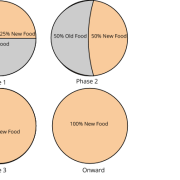Kibble Transition Guide for Picky Cats
As everyone who knows me knows, I always encourage people to get their cats off of kibble and onto a high moisture, high protein, low-carb canned or (ideally) raw food diet. Our kibble transition guide is great place to start.
Convincing some cats to give up their “sugar” addiction isn’t always the easiest transition. For those cats that are giving you a run for your money, here is a step-by-step guide to getting your picky, kibble-addicted cat on the road to a healthier and happier life. Remember patience and persistence are the keys to success!
First, let’s reiterate the importance of getting your cat off of kibble.
- Too low in moisture.
can lead to kidney and urinary tract issues. - Too low in animal protein.
Animal proteins provide the full spectrum of amino acids, including Taurine, which a cat needs, whereas plant-based proteins such as peas and potatoes do not. Peas and potatoes are the most common “binder” found in grain-free kibble, and can make up as much as 44% of the total kibble diet! - Too high in Carbohydrates.
All kibble, even “grain-free,” contains an average of 25% carbohydrate (a cat’s natural diet is generally less than 2%). This excess amount of carbohydrates promotes obesity because it is higher in sugar and causes cats to overeat. Cats tend to overeat kibble because the carbohydrates in it do not trigger satiety like fats and proteins do.
Kibble Transition Guide
- Step 1: Eliminate “free-feeding” (leaving out kibble). Cats will be more inclined to try something new if they are hungry. The most difficult part of transitioning away from free-feeding is often that we humans feel bad taking away their “choice” to eat. However, keep in mind that a cat can easily go 8-12 hours without food, just be sure to leave out water.
- Step 2: Once your cat has not had any food for 8 hours, offer a “stinky” can of cat food, such as B.F.F. Tuna or Weruva Paw Lickin’ Chicken.
If your cat eats the canned food…
- Step 3: Feed your cat canned food 2x/day, always aiming to expand their palate by introducing new proteins and different textures. Don’t get discouraged if all your cat wants to eat is tuna. Eventually your cat will try and like different proteins, but you must be persistent.
- Step 4: When offering new foods, leave new food out for up to 30 minutes and if untouched, place their “old” food next to it or in the same bowl.
- Step 5: Incorporate freeze-dried treats or foods into the diet. Freeze-dried foods have a very distinct odor, flavor and texture which can be very alluring especially when enticing a cat to try something new.
If your cat won’t eat the canned food…
- Step 3: Try sprinkling freeze dried food into the cat’s kibble. Or alternatively, you can try sprinkling a little bit of the cat’s kibble on top of the canned food.
- Step 4: With each feeding, decrease the amount of kibble and increase the amount of freeze-dried or canned food. Remember that because kibble is so high in carbs the cat becomes “addicted” to the sound, smell and texture and the longer the cat goes from having kibble the easier the process will get.
- Step 5: Once the kibble has been eliminated for 4 weeks, try introducing raw food
Why switch to raw from canned? Raw is less processed and therefore more digestible, and surprisingly can be less expensive than doing canned foods.
- Step 6: Because raw food does not have a strong smell, using a little bit of canned or freeze-dried on top of the raw is a great way to entice your cat to try something new. Also be sure to add a bit of warm water to the raw as cats like their food at room temperature.
If your cat does not like the raw, continue serving 1 tsp of raw next to the cat’s current food, either in a separate dish or next to it in the same bowl. Some cats are very suspicious of new things, and this allows your cat to become familiar with the new food and begin to associate the raw with meal time.
Good luck and happy feeding!
If you want to tell us how your cat’s transition to raw food is going, send a us an email at eat@thehappybeast.com, find us on Facebook, or stop by the store.



